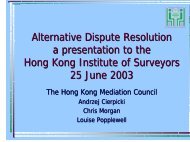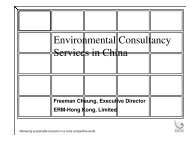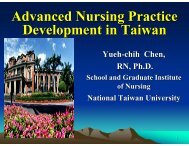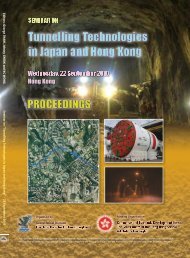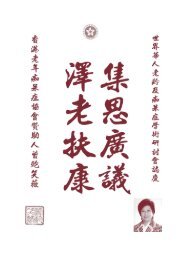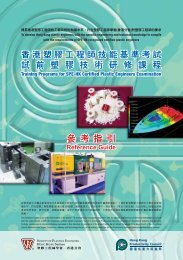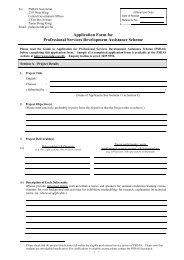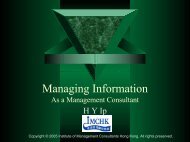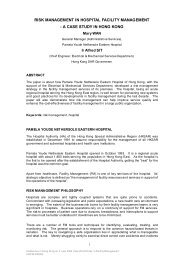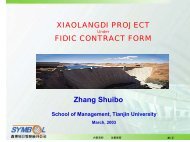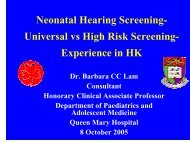Knowledge Management Symposium 2005
Knowledge Management Symposium 2005
Knowledge Management Symposium 2005
You also want an ePaper? Increase the reach of your titles
YUMPU automatically turns print PDFs into web optimized ePapers that Google loves.
EXTENDING THE<br />
FRONTIER OF<br />
KNOWLEDGE<br />
MANAGEMENT<br />
www.kmsymposium.com<br />
20 May <strong>2005</strong><br />
<strong>Knowledge</strong><br />
<strong>Management</strong><br />
agem<br />
<strong>Symposium</strong><br />
<strong>2005</strong><br />
Official Publication<br />
Organizer:<br />
Funded by:<br />
Collaborating Organization:<br />
COMMERCE, INDUSTRY AND TECHNOLOGY BUREAU<br />
THE GOVERNMENT OF THE HONG KONG<br />
SPECIAL ADMINISTRATIVE REGION<br />
Supporting Organizations:<br />
http://www.kmdc.org/<br />
W i d e r W o r l d<br />
Company Limited
The <strong>Knowledge</strong> <strong>Management</strong> Development Centre, Limited, (KMDC) is a<br />
charitable organization set up in 2004 by a group of committed <strong>Knowledge</strong><br />
<strong>Management</strong> Practitioners from various industries and government. The founders of<br />
KMDC are also former executive member of the first KM interest group (in the<br />
form of Communities of Practice) in Hong Kong, the “<strong>Knowledge</strong> <strong>Management</strong><br />
Development Community”. The KMDC aims to promote the awareness and<br />
advance the practice of <strong>Knowledge</strong> <strong>Management</strong> in Hong Kong.<br />
Guest Speakers and KMDC Executive Committee (2004-<strong>2005</strong>) at the<br />
KMDC Grand Launch.<br />
From left: Tse Ming Kin, Trevor Lui (Hon Secretary), Eric Chan, Philip<br />
Fung (Vice Chairman), Mrs. Justina Leung (Executive Director, The Boys<br />
and Girls' Clubs Association of Hong Kong), Mr. Charles Wong (Assistant<br />
Commissioner, Hong Kong Police), Daisy Chou (Chairlady), Victor Leung<br />
(Treasurer), Michael Liang, Ted Ho (Hon Accountant), Alfred Ho, Lau Kit<br />
Pong. Not in picture: Stanley Ng, Tony Yeung.<br />
KMDC held its official launch on 3 December 2004 at the<br />
Senior Officers' Mess, Hong Kong Police Headquarters.<br />
Celebrating this occasion, three prominent KM practitioners<br />
shared the experience and achievement of applying KM in the<br />
disciplinary force, NGO and the commercial sector respectively.<br />
Over a hundred members and guests from different sectors and<br />
trades attended this grand event.
Welcome Message<br />
Mr. Howard Dickson 3<br />
Government Chief Information Officer, The Government of the Hong Kong Special Administrative Region<br />
Ms. Daisy Chou 4<br />
Chairlady, <strong>Knowledge</strong> <strong>Management</strong> Development Centre<br />
Mr. Charles Bien 5<br />
President, Institute of <strong>Management</strong> Consultants of Hong Kong<br />
Table of Contents<br />
Agenda 6<br />
Keynote Speakers<br />
Mr. Bruno Laporte 7<br />
Mr. Charles Wong 8<br />
Mr. Josef Mueller 9<br />
Speakers<br />
Mr. Eric Chan 10<br />
Mr. Philip Fung 11<br />
Dr. Gordian Gaeta 12<br />
Prof. WB Lee 13<br />
Mr. Trevor Lui 14<br />
Mr. Andrew Young 15<br />
Dr. Horace Yuen 16<br />
<strong>Knowledge</strong> <strong>Management</strong> Case Sharing<br />
A Case Study of Bossini 17<br />
A Case Study of The Boy's and Girls' Clubs Association of HK 19<br />
A Case Study of The Hong Kong Police Force 23<br />
Acknowledgement 26
Message from Guest of Honour<br />
Mr. Howard C Dickson<br />
Government Chief Information Officer,<br />
The Government of the Hong Kong Special Administrative Region<br />
Information and knowledge have become increasingly vital to the transition of any economy to<br />
one that is innovation driven and knowledge based. The need for managing knowledge effectively<br />
so as to benefit from it is already a priority item on the management agenda of many<br />
organisations.<br />
Under our Digital 21 Strategy for IT development, we have recognised the need to promote a<br />
vibrant, competitive and innovation driven IT industry in Hong Kong. To maintain Hong Kong's<br />
competitiveness, we must also have adequate and quality human resources in IT to meet the<br />
demand of a knowledge economy and specifically that of commerce and industry. The<br />
Government has been devoting efforts to achieving these goals. We have been extending the<br />
frontier of our efforts by reaching out to the professional bodies and local IT industry. We are<br />
helping the IT industry set up an Industry Training Advisory Committee and develop a<br />
Qualification Framework to define competency standards and aggregate them into qualifications<br />
for different levels of jobs.<br />
The theme of this <strong>Symposium</strong>, the first of its kind organised by the <strong>Knowledge</strong> <strong>Management</strong><br />
Development Centre, "Extending the Frontier of <strong>Knowledge</strong> <strong>Management</strong>", ties in well with what<br />
we have done and will be doing. Events of this kind will certainly provide a valuable forum for<br />
exchanging views, sharing experiences and creating opportunities for co-operation in knowledge<br />
management.<br />
I would like to congratulate the <strong>Knowledge</strong> <strong>Management</strong> Development Centre and the Institute of<br />
<strong>Management</strong> Consultants Hong Kong for successfully organising the <strong>Symposium</strong> with such a rich<br />
programme. Indeed, this is a good example of partnership among professional bodies and the<br />
Government, as the <strong>Symposium</strong> is funded by the Professional Services Development Assistance<br />
Scheme administered by the Commerce, Industry and Technology Bureau of the Government.<br />
I hope the participants will find this <strong>Symposium</strong> useful in providing pointers to how we should<br />
move forward in the knowledge-based society.<br />
3<br />
Extending The Frontier of <strong>Knowledge</strong> <strong>Management</strong>
Message from Organizer<br />
Ms. Daisy Chou<br />
Chairlady, <strong>Knowledge</strong> <strong>Management</strong> Development Centre<br />
<strong>Knowledge</strong> <strong>Management</strong> has become almost the 'talk of the town' in most parts of the business<br />
world today, including Hong Kong. As our operating environment is getting turbulent and<br />
increasingly unpredictable, being able to share effectively knowledge learned in the process of<br />
conducting one's business is a key factor for ensuring success.<br />
In our pursuit of extending the frontier of knowledge management, KMDC is pleased to present to<br />
you a wide range of current examples of KM applications in <strong>Management</strong> Consulting and other<br />
industries at today's KM <strong>Symposium</strong> <strong>2005</strong>. Collaborating with IMCHK as well as support from<br />
sixteen different supporting organizations, we hope that KM <strong>Symposium</strong> can be a powerful<br />
platform that provides a global perspective on KM to the local community.<br />
I look forward to your active participation and taking back home, or office, the valuable<br />
experiences and advice of the seasoned field practitioners who will be presenting in the<br />
symposium today.<br />
Extending The Frontier of <strong>Knowledge</strong> <strong>Management</strong><br />
4
Message from Collaborating Organization<br />
Mr. Charles Bien<br />
President, Institute of <strong>Management</strong> Consultants of Hong Kong<br />
We management consultants are knowledge workers and intellectual properties are our most<br />
important assets. The management of intellectual properties is so logically a critical success<br />
factor to our business, yet often overlooked, particularly among the smaller consulting firms. This<br />
provides a perfect case to promote knowledge management.<br />
The mandate of IMCHK is to promote professional excellence for management consulting, and<br />
most of our members are individual practitioners and small firm operators. We recognize the<br />
importance of knowledge management and are proud to co-host this conference. We believe there<br />
are true synergies between KMDC and IMCHK and this conference will be a good starting point,<br />
providing a platform for our members to get to know each other better and facilitate professional<br />
exchanges.<br />
We welcome you all.<br />
5<br />
Extending The Frontier of <strong>Knowledge</strong> <strong>Management</strong>
AGENDA<br />
8:45am - 9:10am REGISTRATION (Room 401)<br />
9:10am - 9:30am Opening Address from Guest of Honour (Room 401)<br />
Mr. Howard Dickson, Government Chief Information Officer, The Government of the<br />
HKSAR<br />
Welcome Message<br />
Ms. Daisy Chou, Chairlady, <strong>Knowledge</strong> <strong>Management</strong> Development Centre, Ltd (KMDC)<br />
Mr. Charles Bien, President, Institute of <strong>Management</strong> Consultants of Hong Kong (IMCHK)<br />
9:30am - 10:30am Opening Keynote Presentation (Room 401)<br />
Exploring and Re-distributing <strong>Knowledge</strong> for Global Development<br />
Mr. Bruno LaPorte, Manager, <strong>Knowledge</strong> and Learning Services, World Bank Institute, The<br />
World Bank<br />
10:30am - 10:45am<br />
NETWORKING BREAK<br />
10:45am - 11:35am Keynote Presentation (Room 401)<br />
A <strong>Knowledge</strong> Focused Police Force<br />
Mr. Charles Wong, Assistant Commissioner, The Hong Kong Police Force<br />
11:35am - 12:25pm<br />
12:30pm - 2:00pm<br />
Developing a Business-Focused Taxonomy<br />
Mr. Andrew Young, Practice Manager, Factiva<br />
LUNCH BREAK<br />
2:00pm - 2:50pm Keynote Presentation (Room 401)<br />
The Power of External <strong>Knowledge</strong><br />
Mr. Josef Mueller, Managing Partner, China Retail Practice, Accenture<br />
2:50pm - 3:05pm<br />
NETWORKING BREAK<br />
TRACK I (Room 401) TRACK II (Room 405)<br />
3:05pm - 3:55pm<br />
3:55pm - 4:45pm<br />
Exploring Customer <strong>Knowledge</strong><br />
Mr. Philip Fung, Executive Director,<br />
Bossini International Holdings Limited<br />
Collaborative Outsourcing<br />
Mr. Eric Chan, Vice President,<br />
Solution & Bid <strong>Management</strong>, PCCW<br />
Internalizing <strong>Knowledge</strong> from Partners<br />
and Competitors<br />
Dr. Horace Yuen, Principal,<br />
INTI College Hong Kong<br />
Generating Insights from Worker's<br />
<strong>Knowledge</strong><br />
Dr. Gordian Gaeta, Council Member,<br />
IMCHK<br />
4:45pm - 5:30pm Panel Discussion and Closing (Room 401)<br />
Chairman:<br />
* Prof. W. B. Lee, Head, Department of Industrial and Systems Engineering, The Hong<br />
Kong Polytechnic University<br />
Panelists:<br />
* Mr. Bruno LaPorte, Manager, <strong>Knowledge</strong> and Learning Services, World Bank Institute,<br />
The World Bank<br />
* Mr. Charles Wong, Assistant Commissioner, The Hong Kong Police Force<br />
* Mr. Josef Mueller, Managing Partner, China Retail Practice, Accenture<br />
* Mr. Trevor Lui, Senior Consultant, Hong Kong Productivity Council<br />
* The Organizer reserves final right on modifying the programme schedule without prior notice.<br />
Extending The Frontier of <strong>Knowledge</strong> <strong>Management</strong><br />
6
Mr. Bruno Laporte<br />
Manager, <strong>Knowledge</strong> and Learning Services,<br />
World Bank Institute, The World Bank<br />
Bruno Laporte is currently managing <strong>Knowledge</strong> and Learning at the World Bank Institute.<br />
In his current responsibility, he oversees several teams working on knowledge management,<br />
learning, and internet strategy and applications. One of his main responsibilities is to ensure<br />
that knowledge sharing is an integral part of the Bank corporate agenda, to provide advice and<br />
support to all organizational units across the Bank, and to ensure that the internal organization<br />
is aligned to provide an environment conducive to knowledge sharing. He joined the World<br />
Bank in March, 1985 and has worked extensively on education, training and employment<br />
issues in different countries -- Turkey, Egypt, Yemen, Algeria and Tunisia between 1985 and<br />
Keynote Speaker<br />
1990 - - Yugoslavia, Poland, Bulgaria and Hungary between 1990 and 1995 - - Chile,<br />
Philippines, and the Caribbean between 1995 and 2000. Bruno Laporte has a keen interest in<br />
contributing to the shift in development paradigm, based on multi-directional knowledge and<br />
learning flows, and aimed at building capacity and providing opportunities for countries to<br />
identify their own development solutions.<br />
7<br />
Extending The Frontier of <strong>Knowledge</strong> <strong>Management</strong>
Mr. Charles Wong<br />
Assistant Commissioner,<br />
The Hong Kong Police Force<br />
Mr. Charles WONG Doon-yee is an Assistant Commissioner of the Hong Kong Police Force.<br />
He holds a Master's Degree in Criminology from the University of Cambridge. He joined the<br />
Hong Kong Police Force in 1978 and has many years of operational, investigative,<br />
administrative, training and management experience. Between 1992 and 1994, under the<br />
Police Officers Exchange Secondment Scheme, he was posted to the Wiltshire Constabulary<br />
in the United Kingdom, where he undertook the position of the sub-Divisional Commander of<br />
Swindon, an area that was considered to be one of the fastest growing areas in Europe. He is<br />
currently Head of the Service Quality Wing, responsible for strategic planning, performance<br />
Keynote Speaker<br />
audit, performance review and complaint investigation of the Hong Kong Police Force. He is<br />
also responsible for the implementation of knowledge management in the Force.<br />
Extending The Frontier of <strong>Knowledge</strong> <strong>Management</strong><br />
8
Mr. Josef Mueller<br />
Managing Partner,<br />
China Retail Practice, Accenture<br />
Josef (Joe) Mueller is the Managing Partner for Accenture's China Retail practice. He is also<br />
Accenture's technology innovation (eg, RFID) lead for Asia Pacific.<br />
Joe has proven experience helping international and domestic retailers with large scale change<br />
programmes - both startups and mature enterprises. Joe's expertise is in the strategy, planning,<br />
design, build-out, and operations of operating models, including IT shared services.<br />
Joe has more than 20 years in the consulting industry, the past ten years working and living in<br />
Asia Pacific, primarily Thailand, Korea, Hong Kong, and China.<br />
Keynote Speaker<br />
9<br />
Extending The Frontier of <strong>Knowledge</strong> <strong>Management</strong>
Mr. Eric Chan<br />
Vice President, Data Services, PCCW<br />
Executive Committee Member, KMDC<br />
Mr. Eric Chan is a Chartered Engineer (UK), a Chartered Marketer (UK), and a General<br />
Manager of PCCW. Eric is a seasoned executive with management experience in Engineering,<br />
Product, Marketing, business solution consultancy, and has pioneered KM projects in Hong<br />
Kong Telecom/PCCW since 1998. PCCW is the first and only Hong Kong company awarded<br />
with the Asian MAKE (Most Admired <strong>Knowledge</strong> Enterprise) by Know-net Consortium. At<br />
his previous capacity as VP, Solution & Bid <strong>Management</strong>, he actively drives knowledge<br />
creation, sharing and collaboration amongst a large workgroup of knowledge workers and<br />
Speaker<br />
also conducted external consultancy role for clients. Eric speaks frequently at international<br />
conferences on technology and knowledge management.<br />
Extending The Frontier of <strong>Knowledge</strong> <strong>Management</strong><br />
10
Mr. Philip Fung<br />
Director of Human Resources and <strong>Knowledge</strong> <strong>Management</strong>,<br />
Bossini Enterprises Limited<br />
Vice Chairman, KMDC<br />
Mr. Philip Fung is the founding member of <strong>Knowledge</strong> <strong>Management</strong> Development<br />
Community. He is a practitioner and trainer in knowledge management and organizational<br />
learning practices. His current position is the Director of Human Resources and <strong>Knowledge</strong><br />
<strong>Management</strong> of Bossini Enterprises Limited. Prior to Bossini, he was the General Manager-<br />
TQM, Human Resources and Administration of Group Sense Limited (GSL).<br />
Speaker<br />
11<br />
Extending The Frontier of <strong>Knowledge</strong> <strong>Management</strong>
Dr. Gordian Gaeta<br />
Council Member, IMCHK<br />
Gordian Gaeta is a director and founder of a range of consulting and advisory firms as well as<br />
private equity investment companies in services and light manufacturing industries<br />
predominantly in Europe and Asia. He specializes in developing and implementing analytical<br />
solutions for complex strategic issues in financial services and other industries undergoing<br />
significant change or being exposed to intricate risk issues.<br />
In the areas of business analyses, management and investment he brings a wealth of<br />
Speaker<br />
experience having been a partner of Booz, Allen & Hamilton dedicated to strategic issues<br />
both at micro and macro economic levels. Previously an academic and a bank executive in<br />
several countries, Gordian Gaeta holds a master and doctorate in law and read mathematics<br />
and business sciences at the Institutes of Technology of Vienna and Zurich. For the past<br />
twenty years he has been living in Asia but works in most developed economies globally.<br />
Extending The Frontier of <strong>Knowledge</strong> <strong>Management</strong><br />
12
Professor W.B. Lee<br />
PhD, M.Tech, CEng, MIM, MIEE, MHKIE<br />
Chair Professor and Head of Industrial and Systems Engineering<br />
The Hong Kong Polytechnic University<br />
President of the Hong Kong Advancement of the Association<br />
of Science and Technology<br />
Fellow of the World Academy of Productivity Science<br />
Prof. W.B.Lee, is the Chair Professor and Head of the Department of Industrial and Systems<br />
Engineering and the Director of The Hong Kong Polytechnic University Microsoft Enterprise<br />
Systems Centre (MESC).<br />
Professor Lee established the <strong>Knowledge</strong> Solution Laboratory in the MESC, the first of its<br />
kind in Hong Kong, and has pioneered research and practice of KM in various industrial<br />
sectors from manufacturing, public utilities, government, to health-care. He has also led a<br />
research team in the design of an on-line enterprise collaborative platform to enable<br />
Speaker<br />
companies to share and collaborate on projects on a real time basis, and the implementation of<br />
a knowledge work support system based on dynamic taxonomy, a project which aims to<br />
enhance knowledge sharing and productivity for small and medium enterprises. Prof. Lee<br />
speaks at a number of KM events and international conferences. His research results have<br />
been published in various international journals.<br />
Professor Lee is the President of the Hong Kong Advancement of the Association of Science<br />
and Technology. He is also the Past President of Guongdong Hong Kong Association for the<br />
Promotion of Technology Enterprise, Vice-Chairman of the Asian Pacific Academy of<br />
Productivity Innovation and Past Chairman of the Institution of Electrical Engineers (IEE)<br />
Hong Kong. He is a Council Member of the International Society of <strong>Knowledge</strong> and Systems<br />
Science.<br />
He teaches on various courses in knowledge engineering and management, manufactuirng<br />
strategy, and organizational learning. Professor Lee and his team have launched the Asia's<br />
first on-line MSc Programme in <strong>Knowledge</strong> <strong>Management</strong>.<br />
13<br />
Extending The Frontier of <strong>Knowledge</strong> <strong>Management</strong>
Mr. Trevor Lui<br />
Senior Consultant, Hong Kong Productivity Council<br />
Hon. Secretary, KMDC<br />
Mr. Trevor Lui is Senior Consultant of Total Enterprise <strong>Management</strong> Consultancy, Hong<br />
Kong Productivity Council (HKPC).<br />
Trevor has over sixteen years of experience in<br />
management consulting focus in knowledge management, customer management, strategic<br />
planning, marketing and business development. With his current roles in HKPC, he has also<br />
assisted the set up of Asian Benchmarking Clearinghouse, which attained a very high<br />
reputation in the areas of <strong>Knowledge</strong> <strong>Management</strong>, Benchmarking and Customer<br />
Relationship <strong>Management</strong>. Before joining HKPC, he had worked as a manager to set up<br />
Speaker<br />
marketing offices and factories in Canada and China, and also as a consultant to provide<br />
consultancy services in Marketing, <strong>Management</strong> and Business Development.<br />
Trevor holds a Master of Business Administration Degree from the Simon Fraser University<br />
and a Bachelor of Arts Degree in Business Administration from the Trinity Western<br />
University. He is also a certified Benchmarking Consultant from American Productivity and<br />
Quality Center, Houston, USA. With his expertise in <strong>Knowledge</strong> <strong>Management</strong>, he is<br />
recognized by <strong>Knowledge</strong> Associates, UK, as a Certified KM Consultant and a Certified<br />
Master KM Education Trainer. In addition, Trevor is a Certified Trainer of “Who Moved My<br />
Cheese” form Linkage International Ltd, UK.<br />
Extending The Frontier of <strong>Knowledge</strong> <strong>Management</strong><br />
14
Mr. Andrew Young<br />
Asia-Pacific Practice Manager,<br />
Factiva Taxonomy Services<br />
Andrew Young is a managing consultant, working in Factiva's Consulting Services team. His<br />
speciality is the provision of taxonomy advice and expertise in the wider context of<br />
information management and retrieval. In addition to licensing Factiva's off-the-shelf<br />
taxonomies, Andrew has developed a simple framework that enables Factiva to jump-start the<br />
development and delivery of custom taxonomies. With modular service offerings around the<br />
key themes of needs discovery, design, implementation and maintenance, Andrew's mission is<br />
to integrate relevant information into users' workflows and to make searching for information<br />
Speaker<br />
a less onerous task.<br />
This is a field in which Andrew has over 17 years of practical experience.<br />
Prior to joining Factiva Consulting Services in May 2002, Andrew held the position of<br />
Taxonomy Development Manager since the creation of Factiva in May 1999. In that role he<br />
was responsible for creating and maintaining Factiva Intelligent Indexing, the universal<br />
classification scheme which is applied to all content on the Factiva platform.<br />
Andrew previously spent more than 11 years in various editorial and content management<br />
roles for Reuters, tracing his involvement with taxonomy back to 1987 when he was<br />
employed as an indexer on the Reuters Textline service. He has since managed many editorial<br />
teams and projects including the introduction of programmatic indexing to Reuters Business<br />
Briefing in 1998.<br />
Based in the company's Sydney office, Andrew holds a Bachelor of Arts degree in Economic<br />
and Social Studies from the University of Manchester in the UK.<br />
15<br />
Extending The Frontier of <strong>Knowledge</strong> <strong>Management</strong>
Dr. Horace Yuen<br />
Principal, INTI College Hong Kong<br />
Dr. Horace Yuen is a professional management consultant and educator. He is also the writer<br />
of books on career, life nurturing and professionalism. Dr. Yuen holds diversified academic<br />
and professional qualifications in Engineering, Public Administration, Computer Science, and<br />
Laws. Over the past thirty years he has worked at senior position in both the private and pubic<br />
sector organizations including Dietz, Philips, HKPC and the Government Secretariat of<br />
HKSARG. He is now the School Supervisor and Principal of INTI College Hong Kong where<br />
he is committing himself in sharing his experience and knowledge with the younger<br />
Speaker<br />
generation through life-long learning.<br />
Extending The Frontier of <strong>Knowledge</strong> <strong>Management</strong><br />
16
Implementation of <strong>Knowledge</strong> <strong>Management</strong>:<br />
A Case Study of Bossini<br />
Interviewer: Trevor Lui, Senior Consultant, Hong Kong Productivity Council (Trevor)<br />
Interviewee: Philip Fung, Director of Human Resources and <strong>Knowledge</strong> <strong>Management</strong>,<br />
Bossini Enterprises Limited (Philip)<br />
Trevor: When did Bossini start its knowledge management (KM) initiatives? What drove those initiatives?<br />
Philip: Fiscal 2002 spelled trouble for us as operating cost went up while net profit margins were thinning. I saw the<br />
declining financial performance as a symptom of a deeper problem. Following the directives from the Chairman,<br />
Henry Law, who is a firm believer in Stephen Covey's “Seven Habits of Highly Effective People”, I focus in<br />
building a culture of trust and knowledge sharing. By 2003, Bossini formally launched <strong>Knowledge</strong> <strong>Management</strong>.<br />
Unlike a lot of companies that started with buying million-dollar technologies such as document-sharing systems,<br />
I opted for a culture-change campaign at the onset of my KM project. I noticed front-line staff generated a lot of<br />
insightful knowledge through their day-to-day interaction with customers. The question was “How do we collect<br />
and manage all this customer knowledge?” I know that we need to develop new business practice, which we later<br />
named as Shop CKM (Customer <strong>Knowledge</strong> <strong>Management</strong>).<br />
Trevor: What is the actual KM strategy at Bossini?<br />
Philip: A good KM strategy for Bossini has to tie with our company's vision: “To be the top-of-mind brand leader”.<br />
Given competition in retail business is heated and intense, a lot of time, goods sold are similar among players and<br />
difficult to make a difference. Whether one could outperform competition would depend on who could deeply<br />
understand the needs of the customers and get hold of timely market intelligence, such as what latest fabrics are<br />
out there.<br />
Trevor: In which area of your operation has KM been implemented? Is it a pilot project or an enterprise-wide<br />
programme?<br />
Philip: We often started with pilot projects and expanded some really successful ones into enterprise-wise programme.<br />
We got started by forming a cross-functional KM team with eight individuals from Human Resources,<br />
Information Technology, Finance, Retail <strong>Management</strong>, and Marketing. The team underwent a KM diploma<br />
course provided by the <strong>Knowledge</strong> <strong>Management</strong> Development Centre (KMDC) and Hong Kong Productivity<br />
Council (HKPC) to learn how to deal with customer data, people competence, and transfer expertise. They also<br />
brought in experience and knowledge back to the organization to proceed with different experimental projects,<br />
making KM part of their daily activities.<br />
Trevor: Could you share with us the content of your KM programme, and the benefits you received?<br />
Philip: I can share two KM programmes:<br />
•Deploying of Shop CKM (Customer <strong>Knowledge</strong> <strong>Management</strong>) - To Bossini, customer related knowledge, e.g.<br />
their purchasing behavior, color preference, and body type/build is important information. CKM has specially<br />
applied to individual shops to capitalize the insightful knowledge front-line staff generated during their daily<br />
interactions with customers. Shop CKM is a three-step knowledge transfer process consisting Discoveries,<br />
Learning, and then Action.<br />
1) Discoveries - Through front-line staff's observations and sharing of their own tacit knowledge with team<br />
members.<br />
2) Learning - Codify collective knowledge in “what I saw and what I heard” form. Fax to office for storage and<br />
analysis.<br />
17<br />
Extending The Frontier of <strong>Knowledge</strong> <strong>Management</strong>
3) Action - Relevant parties to develop action plan according to the learning discovered. Design Team, Buying<br />
Department are some of the example areas that would effect the actions.<br />
To allow Shop CKM to be carried out effectively, we need to train front-line staff on observation skills and<br />
emphasize their benefits when the head office could better understand their difficulties while selling products to<br />
customers. Such support is worthy as Shop CKM has a number of advantages over a traditional customer<br />
research study in accessing customer information or insight. The turn around time is shorter, the cost is lower,<br />
and in view of a quicker turnaround time, information collected is right on the market and therefore more<br />
accurate. In addition, the staff will have a sense of ownership.<br />
• Conducting AAR (After Action Review) - ARR was presented at three levels: 1) project level, 2) shop level,<br />
and 3) management level.<br />
1) At project level: It applies to big projects like new store opening or store expansion and requires operation to<br />
deliver targets. For example in a new store opening project, the whole project team will be involved in the<br />
AAR after the project finishes. The project manager will chair the review focusing on what was learnt during<br />
the project. Through discussions and experience extracting, knowledge gained could be applied to similar<br />
projects in the future for better and smoother results.<br />
2) At shop level: We made AAR a policy by introducing it to individual shops and infused mystery shopping<br />
exercise as a mean to provide constant challenge and feedback. Headed by the shop manager monthly for an<br />
hour each, the AAR will analyze the sales performance vis-à-vis the sales goal and solicit suggestions for<br />
improvement from staff. It encourages collective wisdom to build a stronger operation team and is a group<br />
learning exercise. Through sharing of experiences from their daily work, it indirectly leads the staff to<br />
realize their mistakes, thereby sharpening the whole team and making it more attuned. At the end of the<br />
review, the Shop Manager will pass the AAR findings to the head office, and the head office will disseminate<br />
information to the related departments. Based on the AAR report, these departments might conduct their<br />
subsequent analysis or AAR. This process of flowing knowledge from the front-line to upper management<br />
and from upper management back to the front-line is not only reverting the traditional top-down approach to<br />
communication, it is also unclogging all knowledge veins in an organization, ensuring knowledge flows to all<br />
areas, and each employee learns and picks up something along the way.<br />
3) At management level: Top management also exercises AAR in reviewing experience in launching a new<br />
brand in China; annual business review in Taiwan, Singapore, China and Hong Kong; and critical business<br />
issues review such as product development and margin management.<br />
Trevor: Were there any difficulties in system implementation? Or were there any difficulties in knowledge-sharing<br />
in particular?<br />
Philip: Our KM philosophy is to focus on people and IT is used as the enabler. I think the main difficulty is the workload<br />
faced by our staff due to rapid business growth. Sometimes, they are just too busy to find time to talk to each<br />
other and share the useful insights.<br />
Trevor: Do you think the implementation of KM helps in differentiating your company from other similar<br />
companies?<br />
Philip: Bossini has to differentiate with competitors through many areas such as branding, products and people. KM is<br />
one of the strategic tools helping us to create a competitive edge. Often, it is hard to isolate the impact of KM on<br />
business. Since KM is still at the early stage of implementation, it will take us a few years before I can gather<br />
enough factual evidences.<br />
Trevor: How do you envision the KM programme in 2 to 3 years' time in your company?<br />
Philip: In the next 2 to 3 years, we will continue to explore KM concepts and integrate them into our business strategy<br />
and daily operations. Recently, I found that Community of Practices (CoP), story-telling, personal knowledge<br />
management (PKM) and taxonomy are some powerful KM ideas that I can use to improve our operations.<br />
Page 4 of 4<br />
Extending The Frontier of <strong>Knowledge</strong> <strong>Management</strong><br />
18
Implementation of <strong>Knowledge</strong> <strong>Management</strong>:<br />
A Case Study of The Boys' and Girls' Clubs Association<br />
of Hong Kong (BGCA)<br />
Interviewer: Trevor Lui, Senior Consultant, Hong Kong Productivity Council (Trevor)<br />
Interviewee: Lilian Law, Assistant Director (Strategy & Development), BGCA (Lilian)<br />
Trevor: When did BGCA start its knowledge management (KM) initiatives? What drove those initiatives?<br />
Lilian: The BGCA was founded in 1936 and has more than 700 full-time staff operating over 55 service centers across<br />
various districts in Hong Kong. Over many decades, the organisation has nurtured a distinctive sharing culture.<br />
However, our sharing activities have been only on an individual face-to-face setting among staff members or<br />
among teams, rather than maintaining an overall corporate memory and experience.<br />
In early 2000, when the organization conducted internal management reviews and carried out re-structuring, we<br />
found that many experienced staff members were about to retire and the organization would be losing an<br />
abundance of knowledge and experience. In light of this, the organization introduced KM at that time in order to<br />
apply effective practices to capture and consolidate the many years of accumulated social services experience and<br />
know-how. KM emphasizes a great deal on the notion of “Corporate Memory”, which is a positive concept and<br />
aim for us in consolidating our organization's vast experience. Therefore, we started to design and implement a<br />
KM programme and roadmap.<br />
In addition to the internal reasons I've just mentioned, a severe external operating environment was another<br />
reason that drove us to adopt KM as we recently encountered a host of new challenges in our operations. Firstly,<br />
with the discontinuation and reduction of government funding, we have had to adopt various HR measures to<br />
assure the organization's survival under today's turbulent conditions. Moreover, social problems and client needs<br />
are changing and are becoming more demanding, so our staff members may not be able to adapt to new<br />
challenges immediately. That's why we are trying our best to equip staff to handle these new problems and help<br />
the organization open up some survival space.<br />
Trevor: What is the actual KM strategy at BGCA?<br />
Lilian: The implementation of KM throughout the organization aims to facilitate our intelligence and experience from<br />
different districts and then upload it all to a shared platform so that staff members from different districts and<br />
departments can access it. After information is shared, we expect that our staff members will be able to transform<br />
these experiences and data into useful solutions based on the circumstances of the cases they are handling.<br />
Over the long term, our organization expects to formulate a more comprehensive KM strategy. In the first two<br />
years, we are concentrating on capturing our staff's knowledge and experience, then facilitating a sharing<br />
atmosphere. As we have staff members who offer different types of expertise, we have formed several<br />
knowledge communities (including: service planning skills and personal growth counseling) through novel<br />
activities according to the different interests of each staff. We have and will also further strengthen these<br />
communities as specific platforms for everyone to share various cases. In addition, we have tied in KM with the<br />
work process, our colleagues would look up on to the platform for programmes and knowledge which are closely<br />
linked to their daily work as well as leave comments and discussions on issues that would affect their daily work.<br />
Furthermore, we have designed programmes, which involve our retired colleagues so they can interact with our<br />
existing staff and pass along years of professional knowledge and expertise.<br />
19<br />
Extending The Frontier of <strong>Knowledge</strong> <strong>Management</strong>
Trevor: In which areas of your operation has KM been implemented? Is it a pilot project or an enterprise-wide<br />
programme?<br />
Lilian: Among more than 200 non-government organizations, the BGCA is one that is funded by the Social Welfare<br />
Department as a pilot organization to implement KM programmes on a wide scale. In July 2003, while launching<br />
the preliminary stage of our KM programme, we selected three groups (school social workers, integrated service<br />
centres and resilience services) of colleagues to form different “pilot teams” with each team comprising ten or<br />
more members. In October 2003, the KM programme was implemented throughout the organization. It has<br />
become an enterprise-wide programme since then and all staff are involved.<br />
Trevor: Could you share with us the content of your KM programme and the benefits you received?<br />
Lilian: We integrated both of the organization's intranet and email systems into the KM system. So, whenever our staff<br />
members access the Internet they can click on the system to check for emails, as well as find out the latest news<br />
and developments in the organization, and even post their own opinions. This system has really become a<br />
convenient portal for our staff to handle their work. In addition, we have set up an internal management team,<br />
which is responsible for continuous oversight of access authorization for different levels of staff.<br />
Though the system has opened for all staff for one and half year, we need more time to observe its overall<br />
effectiveness. However, judged from the active usage with 200 to 300 staff log onto the platform everyday, over<br />
5000 documents uploaded and more than 200 personal KM websites formed, we have no doubt that it has become<br />
a convenient platform for knowledge building and sharing. Some staff have stated personal feedback on the<br />
helpfulness of the KM platform to gain programme ideas and locate relevant experienced colleague to help them<br />
better handle cases and provide services more effectively. In addition, the senior staff at headquarters are able to<br />
oversee case situations, as well as monitor progress and problems encountered by different teams and colleagues;<br />
this helps reduce the number of meetings and save time. Moreover, whenever I come across useful information, I<br />
can upload it to the system for everyone's benefit, and this help enhance communication and sharing between<br />
headquarters and staff members in different districts.<br />
In the long run, the organization hopes that more staff members will continue actively upload their own<br />
knowledge and experiences onto the system. The agency internal KM management team will consciously monitor<br />
through regular benchmarking study, upgrade the platform for more friendly usage and to make on-going future<br />
improvements.. The senior administration would look into the performance level and tangible benefits brought<br />
by the implementation. So far, we have noted active and more innovative knowledge streams appear and more<br />
efficient work habits.<br />
Trevor: Were there any difficulties in system implementation? Or were there any difficulties in knowledge-sharing<br />
in particular?<br />
Lilian: Yes, indeed, we encountered a number of difficulties during the implementation of our KM programme. Here are<br />
a few examples:<br />
Staff Aspect:<br />
1. Some colleagues felt that their own experiences belonged only to themselves and were not willing to share<br />
them with others. But, once we convince these staff members to accept the principle that “They themselves<br />
will reap greater benefits through sharing”, this problem will be overcome.<br />
2. Some colleagues tend to think that their own experiences are not significant and thus not worth sharing.<br />
3. Some colleagues are infrequent computer users so they need more time to familiarize themselves with<br />
computer operation and other relevant skills in order to improve this situation.<br />
4. Some of our school social workers noted that their schools do not provide them with computers and that they<br />
had to bring in their own laptops in order to access our system. However, not all of our social workers have<br />
their own laptops.<br />
Extending The Frontier of <strong>Knowledge</strong> <strong>Management</strong><br />
20
5. Some of our colleagues recognize, at personal level, their lack of systematic knowledge building process and<br />
hence difficult to share. That is why we have organized Personal KM training workshop and encourage them<br />
to develop their personal KM website.<br />
Efficiency Measurement:<br />
It is always a significant issue of how to measure the cost and efficiency of KM. First of all, the impact of KM<br />
cannot be seen immediately but it needs a longer time period to prove its efficiency. The BGCA is not a<br />
commercial organization so it is not appropriate to measure efficiency in terms of pricing and profits. Efficiency<br />
can only be reflected in terms of the improved services we provide to our clients. With this mind, it takes a longer<br />
time to reflect on what really constitutes efficiency. In addition, we must formulate appropriate measurement<br />
indicators and cannot just adapt directly the full set of indicators used in the commercial sector. That's why, one<br />
of our main challenges in implementing KM is how to transform the measurement indicators used in the business<br />
world into indicators that are appropriate for evaluating a social service organization.<br />
Implementation Aspect:<br />
1. When we launched the pilot teams, each team member was clear about the main target of the programme,<br />
which is to form a sharing community. So they actively uploaded their own knowledge and information to the<br />
system. However, when the system was open to all staff throughout the organization in October 2003 we<br />
found that most staff just entered the platform to read but didn't leave any message. This was probably due to<br />
the requirement of inputting their knowledge, or it could have been that were technology limitations in the<br />
uploading process, or some may just still be maintaining the attitude of observers. As time lapse and their<br />
familiarity of system increased, we found more documents uploaded and it leads to another issue, the<br />
harvesting of useful information and knowledge.<br />
2. We have also encountered some difficulties with the IT system because it is a foreign product. When we tried<br />
to customize the system according to our needs (e.g. to change the date interface in both Chinese and English<br />
the from USA system into the British format), the system has unexpected problems and even crashed. We also<br />
discovered that even some minor adjustments also caused significant problems. However, we expect that with<br />
the upgrades of both the hardware and software, there will be fewer problems ahead.<br />
3. “Expectation <strong>Management</strong>” is a very important issue. Colleagues may expect that the system is very<br />
convenient; just a click and it can perform various functions and complete whatever they need to do. With<br />
more frequent uses and more documents uploaded onto the platform, colleagues would push for a more<br />
efficient and powerful search function and minimize any waiting time. Sometimes, the system is not nearly as<br />
convenient as they might expect. Keeping up with colleagues' growing expectation would mean continuous<br />
improvement of the system. Some of such improvement may incur additional resources. Therefore, we would<br />
need to strike a balance: on one hand we make improvements of the platform as far as we can afford and on<br />
the other hand, we build staff's tolerance for accepting the system.<br />
Resources Utility:<br />
While faced with inadequate resources nowadays, we are sometimes trapped in a dilemma over whether or not to<br />
use existing resources for direct services or enhance our IT performance? Of course, we still put most of our<br />
resources into services aspects to provide instant help to those in need. But, we believe that if we can earmark<br />
part of our budget toward the KM system, in the long run, it will enable us and our colleagues to provide even<br />
better and more effective services to a larger number of people.<br />
Trevor: Do you think the implementation of KM helps in differentiating your organization from other nongovernment<br />
organizations?<br />
Lilian: We have clarified our vision with respect to the implementation of a KM platform. The platform is convenient<br />
channel to make explicit the vision and agency strategic direction to all staff. It is also a demonstration on how<br />
we would value the sharing and learning culture in the agency for providing quality service. We expect that in<br />
21<br />
Extending The Frontier of <strong>Knowledge</strong> <strong>Management</strong>
future when our colleagues serve our clients, they will feel that the organization is giving them strong support and<br />
backup with an abundance of accumulated experience and knowledge. So when they encounter any problems<br />
they know how to seek support. Even if they encounter a unique situation, they will know if it is a completely<br />
new problem or there are already solutions to apply. This will help shorten handling times and enhance our<br />
overall service quality. This is the area, I think, which differentiates our organization from other non-government<br />
organizations.<br />
Trevor: How do you envision the KM programme in 2 to 3 years' time in your organization, your sector and in the<br />
economy as a whole?<br />
Lilian: In addition to what I've mentioned, individual staff members are also an important factor to knowledge,<br />
innovation and development. We hope that our colleagues understand that if everyone contributes their own<br />
knowledge to the organization, all will benefit. That's why we encourage more people to participate in the KM<br />
programme. Our organization even hopes to extend the KM culture to different areas of Hong Kong and<br />
convince more organizations to implement it. If this concept becomes widespread in Hong Kong and the<br />
experiences of all of local social workers can be captured, it will certainly give us a competitive edge in Hong<br />
Kong's social services sector. Our organization is actively encouraging this situation, and this is why we are<br />
opening some parts of our system to other practitioners within the sector.<br />
Extending The Frontier of <strong>Knowledge</strong> <strong>Management</strong><br />
22
Implementation of <strong>Knowledge</strong> <strong>Management</strong><br />
A Case Study of The Hong Kong Police Force<br />
Interviewer: Trevor Lui, Senior Consultant, Hong Kong Productivity Council (Trevor)<br />
Interviewee: Charles Wong, Assistant Commissioner of Police, Service Quality Wing,<br />
Hong Kong Police Force (Charles)<br />
Trevor: When did the Hong Kong Police Force (HKPF) start its knowledge management (KM) initiatives? What<br />
drove those initiatives?<br />
Charles: Back in 1998, the IBM Consultancy Report identified that the HKPF held an abundance of knowledge but that it<br />
was strewn everywhere within the Force. Due to the lack of a knowledge management system in place, staff<br />
suffered either from information overload or the inability to attain the required information readily. In some<br />
circumstances, the information remained buried making the dispatch of information within the Force slow. Each<br />
time a new task or assignment was appointed, we were inclined to reinvent the wheel; start everything from<br />
scratch; unwarranted time, and effort was therefore wasted and a longer lead-time became the price we paid.<br />
To remedy this, pilot projects to identify and confirm the need for <strong>Knowledge</strong> <strong>Management</strong> were carried out in<br />
2001, when KM was included as one of the key projects under the Three Year Strategic Action Plan (SAP).<br />
Apart from a need driven by business, there was also a bottom-up need driven by users with Force members<br />
eliciting a strong knowledge acquisition of internal and external good practices and requesting access to policing<br />
knowledge not to be limited to just a small proportion of the population. The sophistication of the society was<br />
also a driver for the need of KM. The public's expectation of a quicker-to-the-scene arrival, a faster crime<br />
resolving lead-time, impediment of a potential crime, or a flawless operation all added to the demand for a more<br />
efficient Force.<br />
In a nutshell, we feel KM is the way to make good use of the rich source of accumulated knowledge and<br />
experience within the HKPF to achieve policing excellence.<br />
Trevor: What is the actual KM strategy in the HKPF?<br />
Charles: Prior to formulating the KM strategy, we need to know our strengths and weaknesses in the sense of what we can<br />
do and what the Force members want, and then to align the strategy with Force's direction, thereby increasing the<br />
KM success rate. Bearing these factors in mind, we have formulated our KM strategy with Codification as the<br />
primary approach supported by Personalization approach.<br />
Codification is a People-to-Document process in short. Its objective is to provide high quality and reliable<br />
information by storing codified knowledge into a system; the whole process involves three steps. To retain<br />
knowledge, a robust IT repository system is deemed a must. Attaining this technology enabler therefore becomes<br />
the first step. Next, we notice a lot of reusable knowledge is embedded in Manuals and Orders. Codifying this<br />
knowledge and uploading it to the KM portal is a natural second step. The Force itself has a lot of explicit<br />
knowledge but the challenge is how to manage it. We then came up with a KM Mind Mapping project to manage<br />
this kind of knowledge.<br />
23<br />
Extending The Frontier of <strong>Knowledge</strong> <strong>Management</strong>
Personalization is our secondary strategy. It is a People-to-People process focusing on introducing customized<br />
solutions to specific problems by systematically identifying and channeling subject matter experts. To facilitate<br />
effective Personalization, we institute People-to-People network, e.g., a Peer Assist initiative (AdvisroryNet-Gets<br />
Expertise Leveraged, ANGEL), study groups, collaboration forums, debriefing sessions, and post-operation<br />
meetings.<br />
On top of this, we are in the midst of designing a Reward and Recognition System to promote KM internally,<br />
which is to encourage Force members to contribute to Force KM initiatives. Officers who make outstanding<br />
contributions to KM will be rewarded and recognized formally.<br />
Trevor: In which area of your operation has KM been implemented? Is it a pilot project or an enterprise-wide<br />
programme?<br />
Charles: After the reviewing exercise conducted by IBM consultants in 1998, we started a pilot in 2001. In June 2002, we<br />
launched the Forcewide KM project with a 5-phase implementation plan. Currently led by the Service Quality<br />
Wing, Phases I and II use the codification approach to place organizational knowledge, such as Force manuals,<br />
orders and policies in the KM system, and to also place readily available unit knowledge, such as Formation<br />
orders, aide-memoires, guidelines and action cards in the same system. They are quick-wins which will make<br />
available a huge amount of organizational and unit knowledge online in a systematic fashion. Most frontline<br />
officers will benefit significantly from these two phases without having to personally contribute to the system. In<br />
doing so, they will be more ready to accept the subsequent phases, which require their contribution.<br />
Trevor: Could you share with us the content of your KM programme, and the benefits you received?<br />
Charles: In addition to the two phases mentioned above, we also featured three other phases in our KM programme.<br />
Phase III is to make less accessible unit knowledge, e.g. legal advice, stated cases, frequently asked questions,<br />
causes of acquittal and commonly made mistakes, available on-line. In Phase IV, Force members will be<br />
encouraged to contribute wherever they see gaps; and to share insights from overseas visits and private study<br />
which would be beneficial to the Force. Phase V is to encourage units and teams to incorporate KM practices<br />
into their work, such as conducting post-operation briefings to identify, document and share lessons as well as<br />
making use of the on-line facilities for team project collaboration.<br />
With the KM programme in place, the Force will receive a list of benefits including:<br />
• Decisions can be based on relevant and up-to-date information;<br />
• Time will be saved by reading information rather than searching for it;<br />
• Standards are set and will be followed ensuring consistency and quality;<br />
• Officers will no longer have to reinvent the wheel as they will be able to learn from the mistakes and successes<br />
of others;<br />
• Information will be available around the clock; and<br />
• Information sharing will be improved and internal communication will be also enhanced.<br />
Trevor: Were there any difficulties in system implementation? Or were there any difficulties in knowledge-sharing<br />
in particular?<br />
Charles: We ran into difficulties on both fronts. In terms of system, we face major frustrations of Content <strong>Management</strong><br />
and Navigation as well as the Search Engine.<br />
Extending The Frontier of <strong>Knowledge</strong> <strong>Management</strong><br />
24
Force members went through and referenced manual files before an electronic platform was available. This<br />
became an ingrained habit, and thereby, a lot of members chose to bypass the present KM system and were<br />
reluctant to contribute their knowledge into the system. Non-user friendly taxonomy was another damper to<br />
Content <strong>Management</strong>. It could not organize the information systematically, which hindered users from<br />
effectively retrieving information by navigation and searching.<br />
Some of the many factors we faced in the journey of implementing KM include:<br />
• Resistance to change;<br />
• Limited awareness of knowledge management leading to over expectation of its impact and results;<br />
• A lack of ownership of the project;<br />
• Misconception of “knowledge is power”;<br />
• Rank consciousness;<br />
• The absence of a change management mechanism; and<br />
• A lack of incentive to motivate members to adopt the changes.<br />
Trevor: Do you think the implementation of KM helps in differentiating your organization from other similar<br />
organizations?<br />
Charles: It is still too early to tell. However, having started the KM programme, we generate a lot of support from our<br />
colleagues. They all agree that knowledge sharing among each other is important and is a way to turn the HKPF<br />
into a knowledge-focused organization, gradually enhancing its overall efficiency, effectiveness and economy.<br />
Trevor: How do you envision the KM programme in 2 to 3 years' time in your organization, your sector and in the<br />
economy as a whole?<br />
Charles: I believe the HKPF's KM programme will keep growing as users start to realize its benefits. While a number of<br />
KM initiatives were conducted ahead of schedule at the request of frontline officers, Phases III to V are still at a<br />
conceptual design stage. The actual needs, priorities and roadmap of future KM development in the HKPF will<br />
need to be thoroughly studied. In addition, to ensure a continued success in the future, the overall KM<br />
organizational structure, roles and responsibilities will need to be carefully considered.<br />
The rewards of KM are drawing a lot of attention. More and more departments in the Government of the<br />
HKSAR have started to embark on the road of KM. On the economy level, it is understood that a “<strong>Knowledge</strong><br />
Economy” will evolve and dominate, where knowledge is the core competence of an organization and society.<br />
Therefore, knowledge management will play an important role in enhancing an organization's competitive edge in<br />
such a turbulent business environment.<br />
25<br />
Extending The Frontier of <strong>Knowledge</strong> <strong>Management</strong>
ACKNOWLEDGEMENT<br />
This project is funded by the Professional Services Development Assistance Scheme of the Commerce, Industry and<br />
Technology Bureau, The Government of the Hong Kong Special Administrative Region.<br />
Special thanks to the following organizations for their kind support to the event :<br />
Collaborating Organization:<br />
Institute of <strong>Management</strong> Consultants of Hong Kong<br />
Contact: Mr. Charles Bien, President<br />
Address: Units 1401 - 1405, 14/F Jardine House, 1 Connaught Place,<br />
Central, Hong Kong<br />
Tel: 2865 2108<br />
Fax: 2866 7052<br />
Email: info@imchk.com.hk<br />
Web: www.imchk.com.hk<br />
Organization Overview/KM Projects/Contributions to KM Community:<br />
The Institute of <strong>Management</strong> Consultants of Hong Kong, IMCHK, is the<br />
professional body that sets and maintains high standards of quality,<br />
independence, objectivity, and integrity for Certified <strong>Management</strong><br />
Consultants originating in Hong Kong and Macau. Founded in October<br />
2000, IMCHK campaigns for greater recognition and strives to enhance the<br />
quality of the profession to match the highest global standards. The Institute<br />
pursues its goals through negotiations with the Government, major<br />
consulting firms and clients principally in Hong Kong but also in Greater<br />
China on standards, methods of consultant selection, methodologies and<br />
best practices, training and development, resolution of disagreement, and<br />
discipline and ethics.<br />
Supporting Organizations:<br />
Name of Organization:<br />
The Academy of <strong>Management</strong> Consultancy Limited<br />
Contact Person: Dr. Gregg Li<br />
Address: 409 Hennessy Road, Suite 2101, Kwangtung Provincial Bank<br />
Building, Causeway Bay, Hong Kong<br />
Tel: 2573 4999, x 101<br />
Fax: 3019 6273<br />
Email: info@academy-mc.org<br />
Web: www.academy-mc.org<br />
Organization Overview/KM Projects/Contributions to KM Community:<br />
The Academy of <strong>Management</strong> Consultancy is a leading professional<br />
training institute for management consultants and management troubleshooters.<br />
The Academy develops clinical tools and courses, works with<br />
organisations to identify a blueprint for transformation, then selects and<br />
trains a few clients and their employees on how to best apply the tools so<br />
that they may champion effective change themselves. All training programs<br />
are developed in-house by leading international management consultants<br />
whom we called Master Trainers. Their products are then licensed and<br />
adapted for corporate clients seeking turnaround solutions.<br />
The Academy has over 50 professors, Master Trainers, and Accredited<br />
Trainers from around the world and works closely with Institute of<br />
<strong>Management</strong> Consultants (IMCs), business schools, and global consulting<br />
practices of leading consulting firms. The Academy is a subsidiary of G. Li<br />
& Company (www.gliandcompany.com), a leading corporate governance<br />
consultancy established in 1991 by several professors and professional<br />
consultants. For more information, please see www.academy-mc.org.<br />
Name of Organization: Bossini Enterprises Limited<br />
Contact Person: Ms. Doris Chan, <strong>Knowledge</strong> <strong>Management</strong> Officer<br />
Address: 6/F., Hong Kong Spinnners Industrial Building, Phase 1 & 2, 601-<br />
603 Tai Nan West Street, Kowloon, Hong Kong.<br />
Tel: 2371 1650<br />
Fax: 2786 0869<br />
Email: doris.chan@bossini.com<br />
Web: www.bossini.com<br />
Organization Overview/KM Projects/Contributions to KM Community:<br />
Organization Overview<br />
Bossini launched its first retail outlet in 1987, selling own label of casual<br />
wear. Over the past two decades, it rapidly established into an international<br />
distribution network with around 700 in 20 countries.<br />
Our KM projects include:<br />
¥ Customer knowledge management (CKM): through front-line staffs<br />
observations and sharing of their own tacit knowledge to capitalize<br />
customer knowledge;<br />
¥ Conducting AAR (After Action Review) at three levels: 1) project level, 2)<br />
shop level, and 3) management level;<br />
¥ KM Portal; and<br />
¥ Community of Practice (CoP) for Retail/Training/HR colleagues<br />
Contributions to KM Community<br />
¥ Corporate member of the <strong>Knowledge</strong> <strong>Management</strong> Development Centre<br />
(KMDC)<br />
¥ Supporting organization of the <strong>Knowledge</strong> <strong>Management</strong> Diploma<br />
Program and <strong>Knowledge</strong> <strong>Management</strong> <strong>Symposium</strong> <strong>2005</strong><br />
Name of Organization:<br />
The Boys’ and Girls’ Clubs Association of Hong Kong<br />
Contact Person: Mr. Ringo Chan, <strong>Knowledge</strong> Development Officer<br />
Address: KDO, 9/F, BGCA, 3 Lockhart Road, Wanchai, Hong Kong<br />
Tel: 2823 8609<br />
Fax: 2865 4332<br />
Email: ringo.ch.chan@bgca.org.hk<br />
Web: www.bgca.org.hk<br />
Organization Overview/KM Projects/Contributions to KM Community:<br />
The Boys’ and Girls’ Clubs Association of Hong Kong had received a grant<br />
in May 2002 to launch the captioned 14-month Business Improvement<br />
Project. The project aims to achieve continuous improvements, through the<br />
Extending The Frontier of <strong>Knowledge</strong> <strong>Management</strong><br />
26
ACKNOWLEDGEMENT<br />
nourishing of sharing culture and utilization of a computerized KM system,<br />
to the business processes, service delivery, know-how of the Association’s<br />
professional social workers and, to a certain extent, the improvement of the<br />
sector as whole. Up to date, the computerized system was constructed and<br />
formally launched in October 2003. A total of 15 District <strong>Knowledge</strong><br />
Platforms; 23 <strong>Knowledge</strong> Banks and 18 worksites have been set up to<br />
facilitate day-to-day sharing. Personal knowledge management is also<br />
stressed and over 200 colleagues have set up their own personal KM sites.<br />
On a daily average, the system records over 37,000 hit rates. The KM<br />
platform is also partially opened to the social service sector in Hong Kong.<br />
Name of Organization: Employers’ Federation of Hong Kong<br />
Contact Person: Ms. Jodi Koon<br />
Address: Suite 2004, Sino Plaza, 255-257 Gloucester Road, Causeway<br />
Bay, Hong Kong<br />
Tel: 2528 0033 (direct line: 2528 0633)<br />
Fax: 2865 5285<br />
Email: efhk@efhk.org.hk<br />
Web: www.efhk.org.hk<br />
Name of the Organisation: Hong Kong Police Force<br />
Contact Person: Mr. Stephen So, Chief Inspector of Police<br />
Address: Service Quality Wing, 27/F, Arsenal House, Arsenal Street,<br />
Wanchai, Hong Kong<br />
Tel: 2860 6578<br />
Fax: 22004312<br />
Email: cip-es-sq@police.gov.hk<br />
Web: www.police.gov.hk<br />
Organization Overview/KM Projects/Contributions to KM Community:<br />
There is a wealth of knowledge available to the Hong Kong Police Force.<br />
Since June 2002, the Force has launched its <strong>Knowledge</strong> <strong>Management</strong> (KM)<br />
project with a 5-phase implementation plan adopted. Codification approach<br />
is applied for the first 3 phases, which are quick-wins and make available a<br />
huge amount of organisational and unit knowledge online in a systematic<br />
manner. The remaining 2 phases will use personalisation approach, in<br />
which Force members will be encouraged to incorporate various KM<br />
practices into their work.<br />
The benefits that the KM project brings to the Force are substantial.<br />
Significant benefits are reaped in terms of operational efficiency, as the<br />
Force members are afforded timely access to current and accurate<br />
information.<br />
Name of Organization: Factiva<br />
Contact Person: Ms. Simone Wheeler, Marketing Director<br />
Address: Suite 4105, Central Plaza, 18 Harbour Road, HK<br />
Tel: 2832 2312<br />
Email: Simone.Wheeler@factiva.com<br />
Web: www.factiva.com<br />
Name of Organization: The Hong Kong Council of Social Service<br />
Contact Person: Mr. Joseph Wong, Business Director (Corporate<br />
<strong>Management</strong>)<br />
Address: 13/F, Duke of Windsor Social Service Building, 15 Hennessy<br />
Road, Hong Kong<br />
Tel: 2864 2992<br />
Fax: 2865 4916<br />
Email: joseph.wong@hkcss.org.hk<br />
Web: www.hkcss.org.hk<br />
Organization Overview/KM Projects/Contributions to KM Community:<br />
HKCSS is an umbrella organization representing non-governmental social<br />
welfare agencies, that strives to sustain and develop social welfare in Hong<br />
Kong.<br />
The Vision of the Council is to build a welfare sector that is highly<br />
accountable, efficient, effective and responsive to social needs, upholding<br />
the long-term sustainable development of society and the well-being of our<br />
citizens.<br />
Towards this end, one of the major work focuses of the Council is to<br />
facilitate learning among the social welfare agencies through sharing, by<br />
various means such as building up knowledge sharing networks, enhancing<br />
distillation and sharing of good practices, promoting KM culture, and<br />
supporting sector-wide or cross-agency KM projects.<br />
Name of Organization:<br />
Department of Industrial and Systems Engineering, The Hong Kong<br />
Polytechnic University<br />
Contact Person: Ms. Nicole Sy, Project Fellow<br />
Address: Department of Industrial and Systems Engineering, The Hong<br />
Kong Polytechnic University, Hung Hom, Hong Kong<br />
Tel: 2766 6560<br />
Fax: 2362 5267<br />
Email: nicole.sy@polyu.edu.hk<br />
Web: www.ise.polyu.edu.hk/km/<br />
Organization Overview/KM Projects/Contributions to KM Community:<br />
The Hong Kong Polytechnic University (PolyU) has a wide range of courses<br />
which directly meets industrial, commercial and community needs is<br />
offered. In addition to meeting Hong Kong’s manpower requirements, The<br />
PolyU also makes significant contributions towards the territory’s success<br />
by providing the public and private sectors with its expanding range of<br />
consultancy, professional training and applied research services. Through<br />
these activities, the University maintains a strong partnership with the<br />
business and industrial sectors.<br />
In the areas of <strong>Knowledge</strong> <strong>Management</strong>, Department of Industrial and<br />
Systems Engineering(ISE) has been actively engaged in scholarly<br />
activities. Over the last years, the Industrial System Engineering<br />
Department has pioneered the practice of KM in various industrial sectors<br />
and prestigious companies in Hong Kong which covers Public Utilities<br />
Airline Industry, Soial Work, Heath Care, Governement Department, and<br />
Manufacturing ... etc. the Department hosts Asia-Pacific’s first on-line<br />
Master of Science porgram in <strong>Knowledge</strong> Manegment as well as a certified<br />
<strong>Knowledge</strong> professionals ( CKP) porgramme for excutives.<br />
27<br />
Extending The Frontier of <strong>Knowledge</strong> <strong>Management</strong>
Name of Organization: Hong Kong Productivity Council<br />
Contact Person: Mr. Trevor Lui, Senior Consultant, Total Enterprise<br />
<strong>Management</strong> Consultancy Division<br />
Address: 3/F, HKPC Building, 78 Tat Chee Avenue, Kowloon, Hong Kong<br />
Tel: 2788 6252<br />
Fax: 2788 6030<br />
Email: trevorl@hkpc.org<br />
Web: www.hkpc.org<br />
<strong>Knowledge</strong> <strong>Management</strong> (KM) is the core service of the company. The<br />
KMbi approach to knowledge management is holistic in nature. The<br />
starting point is linking KM to business objectives and strategies (Strategy).<br />
The other key elements include getting the key knowledge-workers<br />
(People) involved in the process of identifying the critical knowledge<br />
required in achieving the business objectives (Process & Content) and then<br />
determining what systems and platform (Technology) should be in place to<br />
facilitate knowledge capturing, organizing, storage, sharing, collaboration<br />
and renewal.<br />
Name of Organization:<br />
The Institute of Purchasing & Supply of Hong Kong<br />
Contact Person: Mr. Lam Ping Wah,Timothy , Chairman<br />
Address: Network of Networks, 4/F., HKPC Building, 78 Tat Chee Avenue,<br />
Kowloon, Hong Kong<br />
Tel: 2777 4372<br />
Fax: 2301 3978<br />
Email: admin@ipshk.org<br />
Web: www.ipshk.org<br />
Name of Organization: INTI College Hong Kong<br />
Contact Person: Ms. Angel Li, Senior Manager, Corporate Affairs & HR<br />
Address: Units 601-604, Trade Square, 681 Cheung Sha Wan Road,<br />
Kowloon, Hong Kong<br />
Tel: 2380 1132<br />
Fax: 2380 9293<br />
Email: admin@inti.edu.hk<br />
Web: www.inti.edu.hk<br />
Organization Overview/KM Projects/Contributions to KM Community:<br />
INTI College Hong Kong (ICHK) is a branch campus of the international<br />
network of INTI International Group of Colleges. INTI International Group of<br />
Colleges is an educational and training organization publicly listed on the<br />
Malaysia Stock Exchange (MSE) in Malaysia. ICHK offers a full range of<br />
bachelor and master degree programmes including business, IT and health<br />
care with a number of prestigious overseas universities. In addition, ICHK<br />
also offers a variety of continuing education programmes for the local<br />
community. This setup is to meet the overall mission of INTI which is to<br />
provide quality internationalized education and training so as to prepare<br />
learners for facing the career challenges of globalization.<br />
Name of Organization: KM Business Institute Limited<br />
Contact Person: Ms. Nancy A. Ling, Principal and Managing Partner<br />
Address: 1102, 11/F., Tower 1, Lippo Centre, 89 Queensway, Hong Kong<br />
Tel: 9845 3379<br />
Fax: 8343 9895<br />
Email: nancy@kmbi.net<br />
Web: www.kmbi.net<br />
Organization Overview/KM Projects/Contributions to KM Community:<br />
KM Business Institute Ltd. (KMbi) is dedicated to helping individuals and<br />
corporations embrace the challenges of the knowledge-based economy<br />
and transition the revolutionary paradigm shift in business model and work<br />
behavior.<br />
Founder of the company was the Chief <strong>Knowledge</strong> Officer of Global<br />
Business Division, PCCW. Through she persistent efforts in driving KM<br />
within the organization, PCCW was the first and only Hong Kong enterprise<br />
granted the MAKE (Most Admired <strong>Knowledge</strong> Enterprise) award.<br />
Name of Organization: PCCW<br />
Contact Person: Mr. Eric Chan<br />
Address: 33/F PCCW Tower, Taikoo Place, Quarry Bay, HK<br />
Tel: 2888 1589<br />
Fax: 2519 0702<br />
Email: eric.sy.chan@pccw.com<br />
Web: www.pccw.com<br />
Organization Overview/KM Projects/Contributions to KM Community:<br />
PCCW embarked on the KM journey as early as 1998. Initial pilot project<br />
was to improve overall win chance of project bidding through KMenablement<br />
of the knowledge intensive bid management process. Through<br />
a tough and painful journey and with lots of lesson learnt, the pilot project<br />
registered significant business results. Since then, KM concept was then<br />
expanded to other parts of the company. PCCW is the only Hong Kong<br />
company awarded with Asian MAKE (Most Admired <strong>Knowledge</strong> Enterprise)<br />
amongst other top companies such as Sony, Samsung and Fuji Xerox<br />
(Japan) in 2002.<br />
Name of Organization: Policy 21 Ltd., The University of Hong Kong<br />
Contact Person: Miss Candy Ko, Research Officer<br />
Address: Room 129, Eliot Hall, The University of Hong Kong, Pokfulam<br />
Road, Hong Kong<br />
Tel: 2219 4053<br />
Fax: 2858 7219<br />
Email: policy21@hkucc.hku.hk<br />
Web: www.policy21.org<br />
Organization Overview/KM Projects/Contributions to KM Community:<br />
Policy 21 is a fully owned subsidiary of the University of Hong Kong. Its<br />
mission is to serve the community by conducting practically oriented<br />
research and to promote evidence-based planning and policy formulation in<br />
Hong Kong. Policy 21 is also active in knowledge management activities. It<br />
is one of the co-organizers of the highly successful <strong>Knowledge</strong><br />
<strong>Management</strong> Diploma Programme.<br />
Extending The Frontier of <strong>Knowledge</strong> <strong>Management</strong><br />
28
ACKNOWLEDGEMENT<br />
Name of Organization: Strategic Systems Consultants Ltd.<br />
Contact Person: Mr. Stephen Law<br />
Address: Suite 2202-2203, Modern Warehouse, 6 Shing Yip Street, Kwun<br />
Tong, Kowloon, Hong Kong.<br />
Tel: 2389 3217<br />
Fax: 2345 8093<br />
Email: enquiries@ssc-ltd.com<br />
Web: www.ssc-ltd.com<br />
Organization Overview/KM Projects/Contributions to KM Community:<br />
Strategic Systems Consultants Limited provides a comprehensive range of<br />
software consulting and system integration services for the commercial,<br />
government and financial sectors. Our services include strategic systems<br />
planning and feasibility studies, software development outsourcing, data<br />
warehouse design, and skilled staff secondment services.<br />
We have developed a package product called PowerKMTM. This software<br />
not only provides powerful portal and content management functions, but<br />
also serves as a knowledge sharing and collaboration platform. It has been<br />
successfully used by organizations in different industries and businesses as<br />
a technology enabler for knowledge management initiatives.<br />
Name of Organization: WiderWorld Company Limited<br />
Contact Person: Mr. Michael Liang, Director<br />
Address: Room 516, 5/F Tech Centre, 72 Tat Chee Avenue, Kowloon Tong,<br />
Hong Kong.<br />
Tel: 2779 8991<br />
Fax: 2779 5993<br />
Email: info@widerworld.com, michaelliang@widerworld.com<br />
Web: www.widerworld.com<br />
Organization Overview/KM Projects/Contributions to KM Community:<br />
WiderWorld is an Information Technology and Business Process Consulting<br />
Company. Founded in 2000, WiderWorld has been actively promoting the<br />
adoption of KM practice during process improvements and workflow design<br />
engagements. The company continues to raise the awareness of KM<br />
among clients in the commercial, NGO and manufacturing (Gifts, Apparel<br />
and Toys) sectors. Our engagement experiences also include IT Strategy<br />
and Planning, Package and Solution Selection, and Systems<br />
Implementations.<br />
Disclaimer: Any opinions, findings, conclusions or recommendations expressed in this material/any event organized under this Project do<br />
not reflect the views of the Government of the Hong Kong Special Administrative Region or the Vetting Committee for the<br />
Professional Services Development Assistance Scheme.<br />
29<br />
Extending The Frontier of <strong>Knowledge</strong> <strong>Management</strong>
KMDC Regular Events<br />
In line with its goals and objectives, KMDC organizes<br />
discussions and meeting activities on matters of common<br />
interests led by members of KMDC or guest speakers.<br />
The activities include experience sharing sessions,<br />
seminars, conferences, workshops, consultancy projects<br />
and organization visits. To advocate and advance the<br />
level and quality of KM practice, KMDC also<br />
commissions research and development projects by itself<br />
or jointly with other organizations in form of consortium<br />
or other formats as appropriate. Collaborations between<br />
KMDC and individual organizations are taken as separate<br />
projects between the two parties.<br />
Visitations<br />
Visiting World <strong>Knowledge</strong><br />
Forum 2002 in Seoul,<br />
Korea.<br />
Seminars<br />
One of the bi-monthly KM<br />
Seminars for KMDC<br />
Members<br />
Experience Sharing<br />
KMDC Members’ Sharing:<br />
Visits to World Bank<br />
(Washington DC) and<br />
APQC Conference (Texas).<br />
Networking Events<br />
Social Events, Reunion<br />
and Communities of<br />
Practice (CoP) Meetings
<strong>Knowledge</strong> <strong>Management</strong><br />
Diploma Program<br />
KMDC has been organizing the <strong>Knowledge</strong> <strong>Management</strong> Diploma<br />
Program since 2002. It is one of Hong Kong's pioneered KM programs<br />
renowned for its highly practical nature. The program is just finishing its<br />
fourth in-take. It covers a number of key topics, including KM concepts<br />
and strategies, human factors, implementation process, Document<br />
<strong>Management</strong> System (DMS), Business Intelligence (BI) and e-Learning.<br />
The objective of this KM Diploma Program is to present a comprehensive<br />
view on knowledge management. Stay tuned for the fifth in-take of the<br />
program at the end of <strong>2005</strong>. http://www.kmdiploma.com/<br />
KMDC continuous efforts, in promoting the practice of KM in Hong Kong,<br />
do not just stop at the same level. Taking advantage of the funding<br />
support from the HKSAR Government's Professional Services<br />
Development Assistance Scheme, KMDC last year took the<br />
initiative of staging our first <strong>Knowledge</strong> <strong>Management</strong> <strong>Symposium</strong><br />
(<strong>2005</strong>) in the hope of further publicizing the gospel of KM<br />
practices. With more and more local organizations taking on KM<br />
practices, adopting tools of different kinds in solving their<br />
problems and enhancing their operational effectiveness, KMDC<br />
utilizes its pool of first-hand experiences that other organizations may<br />
find useful for their reference and possible adoption.<br />
http://www.kmsymposium.com/<br />
Contact Info:<br />
Administrative Officer: Ms. Grace Lung<br />
Address: Room 505, 5/F Far East Consortium Bldg., 121 Des Voeux Road, Central, Hong Kong<br />
Tel: +852 8101 5632(KMDC)<br />
Fax: +852 8102 5632(KMDC)<br />
Email: info@kmdc.org<br />
Web: http://www.kmdc.org



